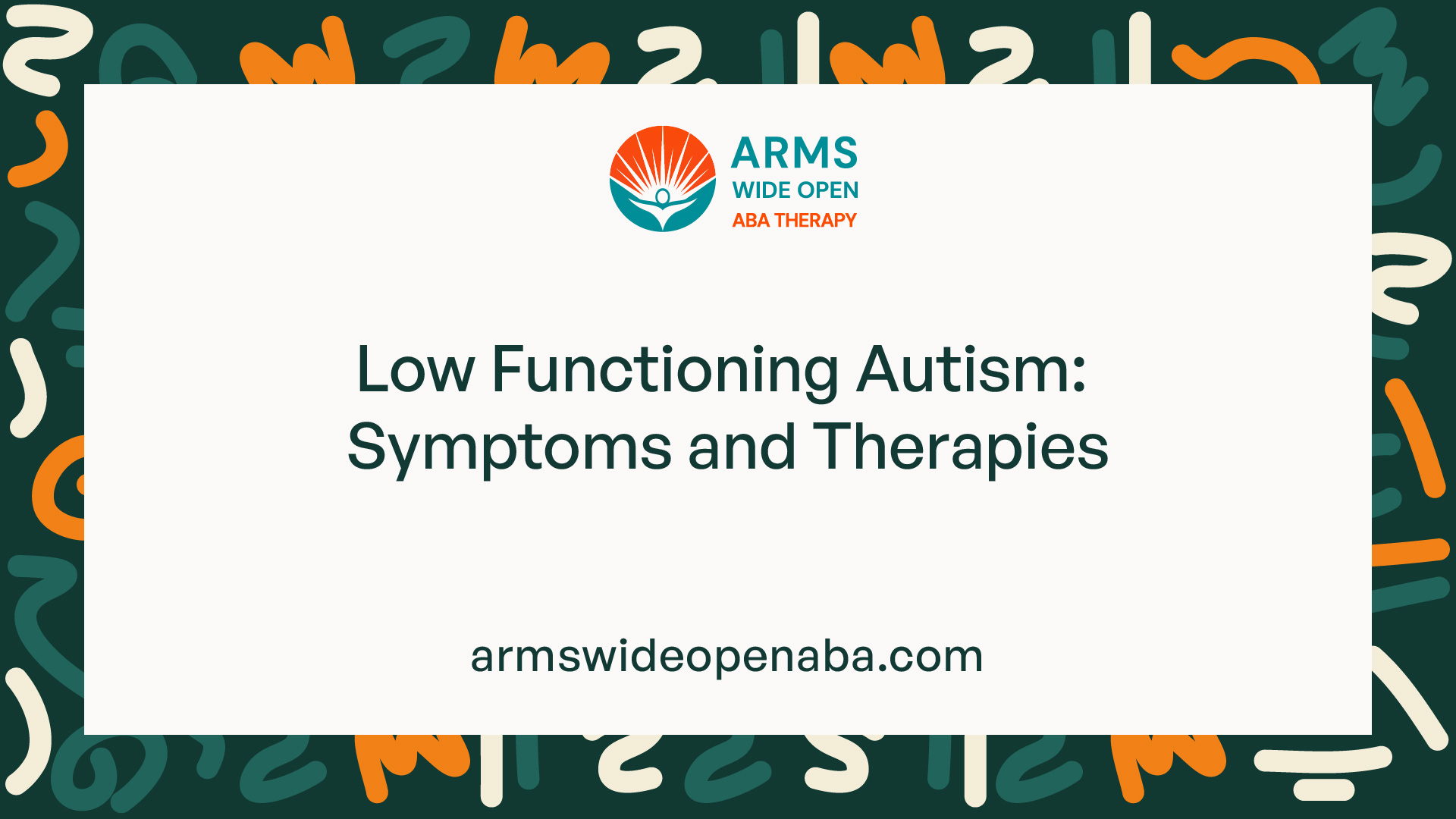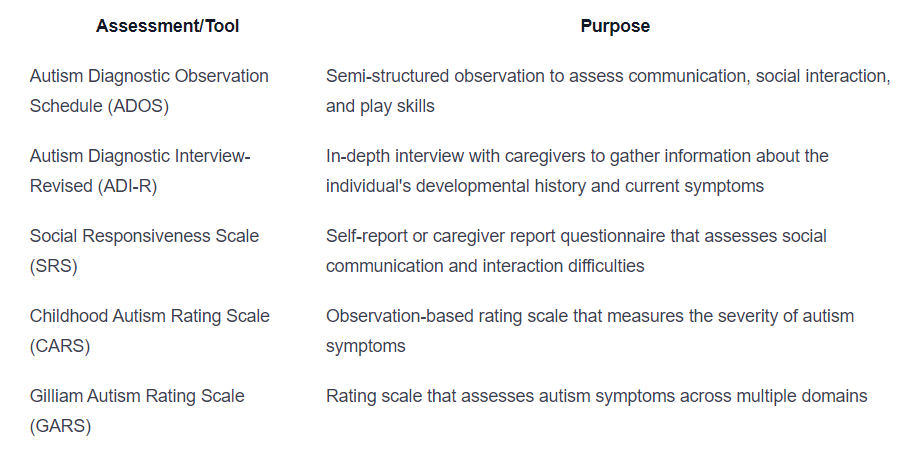Low Functioning Autism: Symptoms and Therapies
Unveiling autism symptoms in adults: Learn to decode the enigma and find support for a fulfilling life

Autism Spectrum Disorder in Adults
Autism Spectrum Disorder (ASD) is a neurodevelopmental disorder that affects individuals across their lifespan. While autism is often associated with childhood, it is important to recognize that many individuals continue to experience autism symptoms into adulthood. In this section, we will explore and unravel the enigma of autism in adults.

Understanding Autism Spectrum Disorder
Autism Spectrum Disorder is a complex condition characterized by difficulties in social interaction, communication challenges, and the presence of restricted and repetitive behaviors. These symptoms can vary widely in their severity and impact on individuals' daily lives.
Prevalence of Autism in Adults
While research on autism has primarily focused on children, recent studies have shed light on the prevalence of autism in adults. According to the Centers for Disease Control and Prevention (CDC), approximately 1 in 54 individuals in the United States are diagnosed with autism. However, it is important to note that the prevalence rate in adults may be higher, as many individuals may have gone undiagnosed or misdiagnosed during childhood.
Challenges of Identifying Autism in Adults
Identifying autism in adults can be challenging due to various factors. Some individuals may have learned coping mechanisms that mask their symptoms, while others may have received a late diagnosis. Additionally, the presentation of autism symptoms can differ in adulthood compared to childhood, making it more difficult to recognize.
To aid in the identification process, professionals may use diagnostic criteria, assessments, and screening tools specifically designed for adults. These tools take into account the unique challenges faced by adults with autism and help to ensure accurate diagnosis and appropriate support.
Understanding autism in adults is crucial for providing the necessary support and resources to help individuals navigate daily life. By recognizing the prevalence of autism in adults and the challenges associated with identification, we can work towards creating a more inclusive and supportive society for individuals on the autism spectrum.
Common Symptoms of Autism in Adults
Autism in adults can present with a wide range of symptoms that can vary in severity and manifestation. It's important to recognize and understand these symptoms to provide appropriate support and interventions. Here are three common symptoms of autism in adults: communication difficulties, social interaction challenges, and restricted and repetitive behaviors.
Communication Difficulties
Adults with autism often experience difficulties in communication. They may have challenges with verbal and nonverbal communication skills, making it challenging for them to express their thoughts, feelings, and needs effectively. Some common communication difficulties observed in adults with autism include:
- Delayed speech and language skills: Adults with autism may have delayed language development, difficulty initiating or sustaining conversations, and limited vocabulary.
- Literal interpretation: They may struggle with understanding figurative language, sarcasm, or nuances in communication, taking things literally.
- Echolalia: Repetition of words or phrases heard from others, which can be immediate or delayed.
- Difficulties with nonverbal communication: Adults with autism may struggle with understanding or using gestures, facial expressions, and body language.
Social Interaction Challenges
Social interaction challenges are a hallmark of autism in adults. Individuals with autism may have difficulties understanding and interpreting social cues, leading to challenges in building and maintaining relationships. Some common social interaction challenges observed in adults with autism include:
- Difficulty with social cues: Adults with autism may struggle to understand facial expressions, tone of voice, and body language, making it challenging to accurately interpret others' emotions or intentions.
- Limited eye contact: They may avoid or have minimal eye contact during conversations or social interactions.
- Lack of social reciprocity: Adults with autism may have difficulty taking turns in conversations, sharing interests, or understanding the give-and-take nature of social interactions.
Restricted and Repetitive Behaviors
Another common symptom of autism in adults is the presence of restricted and repetitive behaviors. These behaviors often serve as a way for individuals with autism to cope with their environment or manage anxiety. Some examples of restricted and repetitive behaviors in adults with autism include:
- Stereotyped or repetitive movements: Adults with autism may engage in repetitive movements, such as hand flapping, rocking, or spinning.
- Rigid adherence to routines: They may have a strong need for structure and predictability, becoming distressed by changes in routine or unexpected events.
- Fixated interests: Adults with autism may display intense interests in specific topics or objects, often focusing on them to the exclusion of other activities or conversations.
Understanding and recognizing these common symptoms is crucial for early identification and intervention for adults with autism. By addressing these challenges, individuals with autism can receive the support they need to improve their communication skills, navigate social interactions, and manage restricted and repetitive behaviors effectively.
Challenges Faced by Adults with Autism
Living with autism presents unique challenges for adults. These challenges can impact various aspects of their lives, including employment and education, relationships and social life, and daily living skills.
Employment and Education
Adults with autism often face difficulties in finding and maintaining employment. The characteristics of autism, such as social communication difficulties and restricted behaviors, can make it challenging to navigate the workplace environment. Some individuals may struggle with understanding social cues, following instructions, or managing sensory sensitivities in a work setting.
According to research, the unemployment rate among adults with autism is significantly higher compared to the general population. However, with the right support and accommodations, many individuals with autism can thrive in the workplace. Employers can provide training programs, modify job tasks, and create a supportive work environment to facilitate the success of employees with autism.
Relationships and Social Life
Developing and maintaining relationships can be a major challenge for adults with autism. Difficulties with social interaction, understanding nonverbal cues, and expressing emotions can hinder the formation of meaningful connections. This can lead to feelings of isolation and loneliness.
Building social skills through therapy and support groups can help adults with autism improve their ability to navigate social situations and create meaningful relationships. Social skills training programs provide individuals with strategies for effective communication, understanding social cues, and developing friendships.
Daily Living Skills
Daily living skills encompass a range of activities necessary for independent living, such as personal hygiene, meal preparation, household chores, and managing finances. Individuals with autism may struggle with developing and maintaining these skills, which can impact their ability to live independently.
Occupational therapy plays a crucial role in helping adults with autism develop and improve their daily living skills. Occupational therapists work with individuals to cultivate self-care abilities, enhance organization and time management, and improve problem-solving skills. These interventions aim to promote independence and enhance overall quality of life.
Understanding the challenges faced by adults with autism is essential in providing the necessary support and resources. By addressing the specific needs related to employment and education, relationships and social life, and daily living skills, individuals with autism can lead fulfilling and meaningful lives.
Diagnosis and Assessment
Accurate diagnosis and assessment play a crucial role in understanding and supporting adults with Autism Spectrum Disorder (ASD). This section explores the various methods and tools used in diagnosing and assessing autism in adults.
Clinical Evaluation and History
Diagnosing autism in adults often involves a comprehensive clinical evaluation and gathering a detailed history. A healthcare professional, such as a psychiatrist or psychologist, will conduct interviews and assessments to evaluate the individual's social, communication, and behavioral patterns. They may also gather information from family members, caregivers, or teachers to gain a comprehensive understanding of the individual's developmental history.
Diagnostic Criteria for Autism Spectrum Disorder
The diagnosis of autism in adults follows the same criteria as in children, as outlined in the Diagnostic and Statistical Manual of Mental Disorders (DSM-5). The DSM-5 criteria include persistent deficits in social communication and interaction, along with restricted and repetitive patterns of behavior, interests, or activities. To meet the diagnostic criteria, these symptoms must be present in early childhood and cause significant impairments in daily functioning.
Assessments and Screening Tools
Various assessments and screening tools are utilized to aid in the diagnosis and assessment of autism in adults. These tools help professionals gather objective data and measure the presence and severity of autism symptoms. Some commonly used assessments and screening tools include:

These assessments and screening tools, in conjunction with clinical evaluation and history, aid in the accurate diagnosis and assessment of autism in adults. It's important to consult with a qualified healthcare professional who specializes in autism to ensure a comprehensive evaluation.
Understanding the diagnosis and assessing the symptoms of autism in adults is vital in providing appropriate support and interventions tailored to their unique needs. With the right diagnosis, individuals with autism can access the necessary resources and therapies to help them thrive and lead fulfilling lives.
Support and Therapies for Adults with Autism
Individuals with autism can benefit greatly from various support and therapies that aim to enhance their overall well-being and quality of life. In this section, we will explore three key types of therapies commonly used for adults with autism: behavioral therapies, social skills training, and occupational therapy.
Behavioral Therapies
Behavioral therapies are widely recognized as an effective approach for individuals with autism. These therapies focus on improving behaviors and reducing challenging behaviors through structured interventions. Applied Behavior Analysis (ABA) is one of the most well-known and evidence-based behavioral therapies.
ABA employs techniques such as positive reinforcement, prompting, and shaping to modify behaviors and teach new skills. It can be tailored to address specific needs, such as improving communication, social interactions, and daily living skills. The goal of ABA is to enhance adaptive behaviors and reduce behaviors that may interfere with daily functioning.
Social Skills Training
Social skills training is vital for individuals with autism who may struggle with social interactions and communication. This type of therapy helps individuals develop the necessary skills to engage with others, understand social cues, and navigate social situations effectively.
Social skills training often involves structured activities, role-playing, and group settings to provide opportunities for practice and reinforcement. It focuses on areas such as conversation skills, nonverbal communication, understanding emotions, and building friendships. By honing these skills, individuals with autism can enhance their social interactions and establish meaningful connections with others.
Occupational Therapy
Occupational therapy plays a crucial role in supporting adults with autism in developing and enhancing their daily living skills. This therapy aims to improve their ability to perform everyday tasks, promote independence, and enhance their overall quality of life.
Occupational therapists work with individuals to address challenges related to self-care, fine motor skills, sensory integration, and organization. They provide strategies, exercises, and activities tailored to the individual's specific needs. Through occupational therapy, adults with autism can gain valuable skills that enable them to navigate daily routines and achieve greater independence.
It's important to note that the specific therapies and interventions recommended for adults with autism may vary depending on individual needs and preferences. A comprehensive assessment by qualified professionals is crucial to identify the most suitable therapies for each individual.
By utilizing behavioral therapies, social skills training, and occupational therapy, adults with autism can enhance their abilities, overcome challenges, and lead fulfilling lives. These therapies, along with ongoing support from professionals, caregivers, and support groups, can make a significant difference in the lives of individuals with autism.
Resources and Support
When it comes to autism in adults, accessing appropriate resources and support is crucial. Fortunately, there are various organizations, services, and assistance available to provide guidance and help individuals with autism navigate their daily lives. This section will explore some of the key resources and support options for adults with autism.
Support Groups and Organizations
Support groups and organizations play a significant role in providing a sense of community, understanding, and guidance for individuals with autism. These groups offer a platform for individuals to connect with others who share similar experiences, exchange information, and seek support. Here are a few notable support groups and organizations:
Support Groups and Organizations
Autism Society of America
Autism Speaks
National Autistic Society (UK)
Asperger/Autism Network
Autistic Self Advocacy Network
Counseling and Mental Health Services
Counseling and mental health services are essential for individuals with autism to address their emotional well-being and navigate the challenges associated with their condition. These services can provide support for anxiety, depression, and other mental health concerns that individuals with autism may face. Some counseling and mental health services that specialize in autism include:
Counseling and Mental Health Services
Autism Treatment Network
Autism Resource Centre (ARC)
Autism Support Network
Autism Consultants
Autism Behavioral Services
Financial and Legal Assistance
Individuals with autism and their families may require financial and legal assistance to ensure they receive the support they need. Financial assistance can help cover the costs of therapies, treatments, and support services. Legal assistance can provide guidance on matters such as disability rights, guardianship, and special education. Here are some resources for financial and legal assistance:
Financial and Legal Assistance
Social Security Disability Insurance (SSDI)
Supplemental Security Income (SSI)
Medicaid
Special Needs Alliance
Autism Legal Resource Center
These resources and support options can significantly contribute to improving the quality of life for adults with autism. It's important for individuals and their families to explore these options and find the ones that best suit their specific needs. Additionally, healthcare professionals and therapists can provide valuable guidance in connecting individuals with the appropriate resources and support networks.
Sources
https://www.thetreetop.com/aba-therapy/low-functioning-autism
https://www.songbirdcare.com/articles/low-functioning-autism
https://www.abtaba.com/blog/low-functioning-autism
Similar articles
We’re here to help you

Our team is here to assist you in this process. Contact us for any assistance.
it’s easy to apply
We Accept Most Insurances
Our in-network insurance partnerships make ABA therapy more accessible to families throughout our service areas.







Our Insurance Process
We'll request your insurance details to help us verify your plan's coverage for ABA therapy. Once we've received this information, we'll walk you through your benefits, including copayments, deductibles and out-of-pocket maximums, so you know what to expect in advance.
Our team will then handle the preauthorization and all the necessary paperwork.
.svg)





















.jpeg)


































.jpeg)




.jpeg)







.jpeg)











.jpeg)
















